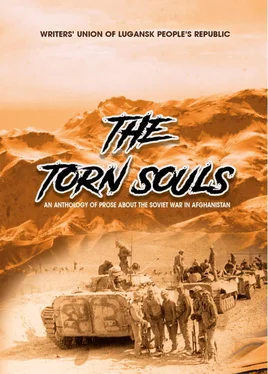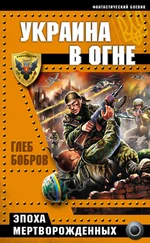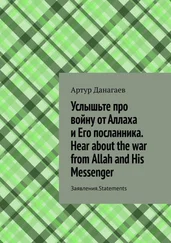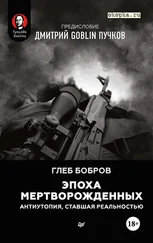Where to go now? Maybe to the Eleventh company to my friends to smooth my uneasy decision.
On return back to my bunk, I am tossing sleeplessly. “How is it possible?” — the thought drills my brains all night.
In the morning, I can see clouds of dust on the horizon. This is a column with a military escort. They started marching very early, at dawn, from the Barracks, and now they managed to get to headquarters exactly for breakfast. We run towards them to meet the whole brigade.
Dimych is fully covered by dust, Komarik as usual is merry and happy. The march went without incident. It is a good road along the desert with very little “green” on the way. This is why enemies practically do not attack. Although last year, some stoned dukhs (see “Terminology and Glossary” — Editor) tried. But one place is particularly cursed. This is close to a damaged bridge near Altamur, but we know about it and always “comb” it before marching.
— Sanka, — Dymych turns towards me. — I do not understand what is going on. K…. is screaming. He ordered to collect all your stuff and bring it with the column. I collected everything I could find… What is this nonsense?
— Dymych, I received the order not to return to the battalion.
— Now I got it. Do not worry, Sanka, “justice will prevail!”… The main thing is that we are alive. Who is this? — and he pointed by a finger at my replacement.
— He is my replacement, — I answered, — and this is our new company commander, — and I introduced Dimych to Yunusov.
I decided to leave my AK (see “Terminology and Glossary” — Editor) with Yunusov and told Dimych to officially transfer my gun to Yunusov.
— Savin! — I shouted to the deputy commander of the machine-gunners, — here is Senior Lieutenant Yunusov — the third platoon commander. You will give him my safe vest, a radio station, a radio-helmet and explain to him what is what. You know… code of calls, frequencies. And now line up the soldiers.
Ten people lined up.
I looked at them and a spasm squeezed my throat.
— Lads! My last order to you is to return home safely! Is it clear?
— Yes, sir! — There were dissonant voices in response.
They all feel that I am no longer a part of their life. I am already in a different dimension but they have to stay. Who will return home, only God knows, but I tried my best to keep you all alive. I did not want them to see my tears, and in a broken voice, choking, I commanded:
— Dismiss!
Together with the officers I sat down on the spare wheels that were laying near the APC. There was no need for farewell words. We kept silent. We finished our cigarettes and…
All get ready! The 371st, 375th, 378th started the movement at the maximum speed. Follow me! March! — the words, which my regular teams learned as a song, were clearly heard in the air. Mishka and Komarik waved goodbye to me.
They were moving towards a battalion location. I was going forward to a new life.
Forgive for everything and do not remember bad things.
That was all.
Afghanistan got rid of me. However did I get rid of Afghanistan? This was unknown.
* * *
— This is my story, Dima! — I finished telling my short story.
— Well, now everything is clear! — Dima Shesternin said, — This K. is an asshole and I am going to tell you about K.…
— Dima, today is our meeting, Let’s not talk about bad things. God will judge him.
Voronin, Anatoly Yakovlevich was born in 1951 in Astrakhan. He worked in the MVD system. From 1986 to 1988 was a consultant for Internal Affairs of People’s Police of Afghanistan at the Kandagar Province. He retired as a Colonel and lives in Astrakhan.
Hadji Latif was not just an ordinary military commander, he was a leader of an Islamic movement at the Daman county he was the most respected mujahidin (see “Terminology and Glossary” — Editor) in this, the most rebellion area out of a whole province of Kandagar (see “Terminology and Glossary” — Editor). However, the inhabitants of Kandagar and settlements near by respected him not because he was well-positioned in the Islamic organisation. This old men, in his well past 80s, was famous for the hadzh (see “Terminology and Glossary” — Editor) in his youth, when he walked to the sacred land of the Prophet Muhammad. During his long journey across the mountains and deserts, he smashed his foot to bloody blisters, under the merciless southern sun his body conditioned to the stage that it had no muscles at all, only stinging, crunchy veins, thoroughly saturated with bitter, smelly salt from the evaporated sweat.
In those early years, a very young Latif achieved what he wanted — he touched the sacred Kaaba (see “Terminology and Glossary” — Editor) with his hand.
Woy, what a miracle! Allah has noticed the submissiveness, devotion and suffering of Latif, or nowadays is Hadji Latif, and has extolled him above all other tribesmen and descendants of the Kukuzai, the Pashtun tribe. Latif received his primary education in a madras (see “Terminology and Glossary” — Editor) during the time when his father — a petty shopkeeper — was alive and was selling the basic necessities and goods from his little shop. By the age of twelve, Latif learned by heart all suras (see “Terminology and Glossary” — Editor) and verses from the Koran. Without any difficulties, he also mastered arithmetic and geometry, and learned how freely operate with the large numbers. There, in the madrasa, secretly from mualems (see “Terminology and Glossary” — Editor), the young Latif has read the books of Oriental sages, comprehending the truth of life extracted from the book of Eastern wise men. He learned a lot about the history of the East, about the life of peoples who inhabited it. Science and wisdom in all disciplines — philosophy, astronomy and medicine — had been penned to him.
Unfortunately, the typhoid epidemic that swept throughout Afghanistan, did not pass Kandagar. The first one, whom the merciless disease brought down, was his father, who, at that time, was not even forty years old; and second one was his mother, who looked after her sick husband. They died with a difference of one day. The death did not give her mercy to youngest four children in the family. She collected all of them with her bony cruel hands.
After burying close relatives, Latif was left alone with the harsh reality of life. His father’s shop, for allegedly having debts, was taken by a wealthy shopkeeper, called Kazi. Whether these debts existed or not, is no one knew, but for Latif it was useless to appeal to Kazi, because no one even will not consider of listening the beardless orphan. Even more, for this greedy shopkeeper, who already coveted someone else’s property to himself, seems to be not enough what he got, so he fabricated a deed, according to which the Latif family’s house was sold during the time when his father was alive; and the house also fell into the ownership of this scoundrel.
Left without housing and means of subsistence, Latif wandered where his eyes were looking. This is how he found himself in the village of Loy-Karezak.
Glory to Allah, who did not abandoned Latif in his devastation and struggling, who did not allowed him to die from starvation. One day, a local rich man was riding the donkey, when he noticed a lonely, wandering on the road teenager. After asking the boy who is he and where he is going, the rich men immediately saw an opportunity to have an extra pair of hands and offered to work for him. Since Latif had no other alternative, he agreed without hesitation.
From dawn to dusk, under the blazing ruthless of the Afghan sun, Latif mastered the wisdom of the slave labouring. Working hard on his master’s land, he sincerely hoped that his laborious effort would not be wasted, and sooner or later, the Supreme will spotted him, and will help him to rise about a crowd.
Читать дальше










